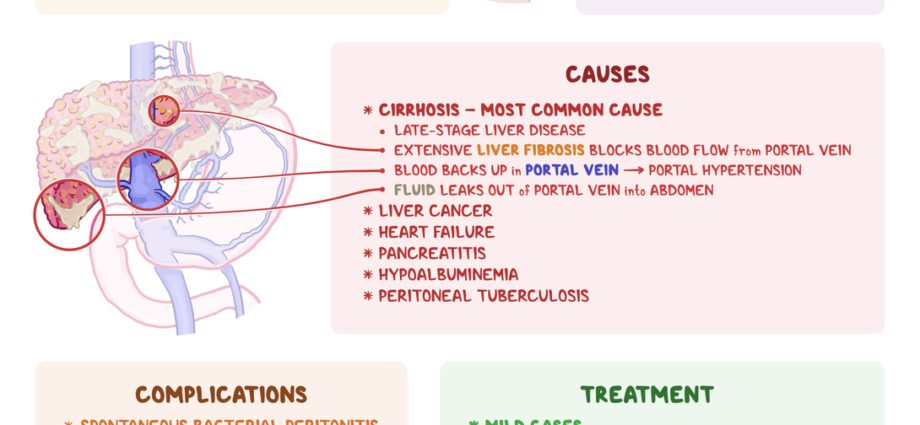Contents
Ascites: causes and treatments
Ascites is a buildup of fluid in the abdomen. Usually originally a problem with the digestive system (and in particular cirrhosis or alcoholic hepatitis). While not a life-threatening condition, it can still be a sign of severe liver damage.
Description: what is ascites?
Ascites is an effusion of fluid (or accumulation of fluid) in the peritoneal cavity, that is, inside the membrane that surrounds the abdominal viscera. In everyday language, we sometimes speak of “water in the stomach”. We also use the term ascites to designate this fluid that accumulates in the abdomen.
Normally, very little liquid is present in the peritoneum, but its accumulation will lead to the appearance of symptoms and possible complications. Ascites is not a life-threatening condition, but can be a sign of severe liver damage.
Depending on the original cause of ascites, symptoms may appear suddenly or develop slowly. It is also possible, when the effusion is weak, that it is asymptomatic.
Fluid buildup is usually accompanied by swelling of the belly and rapid weight gain, abdominal pain, and a feeling of bloating. Large amounts of fluid can also cause shortness of breath.
Other frequently associated symptoms include:
- nausea and vomiting;
- swelling of the legs and ankles;
- indigestion;
- heartburn;
- or even a loss of appetite.
If the amount of fluid in the abdomen is large, physical examination is sufficient for diagnosis. If the effusion is limited, an ultrasound may be necessary. Further examination, involving an abdominal scan (computed tomography) can also help determine the cause of ascites. And an ascites puncture may be needed to analyze the fluid to determine the source of the effusion and look for possible infection.
Causes of ascites
Three mechanisms can lead to the appearance of ascites:
- rupture of a fluid duct inside the peritoneum;
- abnormal reabsorption of peritoneal fluid normally present;
- or excess production of peritoneal fluid.
Different diseases can be at the origin of these mechanisms:
- la alcoholic cirrhosis. In this case, the symptoms may appear suddenly with a large accumulation of fluid. We speak of oedemato-ascitic decompensation;
- alcoholic hepatitis;
- diseases that can cause severe damage to the liver, such as chronic infections such as hepatitis C or B;
- or cancers of the digestive system, such as colon, pancreatic and liver cancer, but also ovarian and uterine cancers, as well as peritoneal carcinomas (metastatic tumors invading the peritoneum).
More rarely, peritoneal tuberculosis and chronic pancreatitis can be causes of ascites.
Evolution et complications possible
Ascites does not represent a fatal danger in itself and the main risk of the accumulation of fluid in the belly is infection of the fluid. In this case, it becomes a medical emergency that must be treated quickly with antibiotics. The accumulation of fluid can also cause respiratory problems by compression of the diaphragm or pleural effusion, as well as abdominal or umbilical hernias.
Treatment and prevention: what solutions?
If possible, the disease causing the effusion should be treated first.
Ascites prevents the elimination of salts through urine. A first step in treatment therefore consists in reducing the salt intake in the diet by a salt-free diet. The doctor may also prescribe diuretics, to help remove the fluid.
If the ascites is abundant and persists despite medical treatment (salt-free diet and diuretics), an ascites puncture may be performed to relieve the patient by decompressing the abdomen.
Antibiotic treatment will be recommended in the event of a complication by infection.










